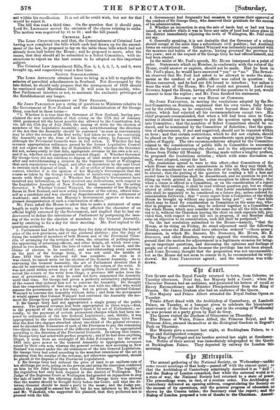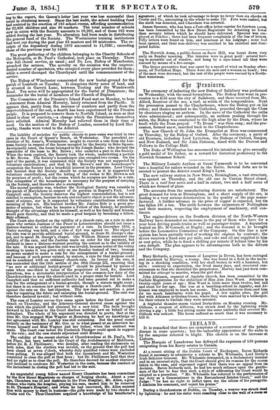'i aittruf The annual gathering of the National Society, on
Wednesday—unlike some recent meetings of that body—passed off with the utmost quiet ; so that the Archbishop of Canterbury admiringly described it as 4‘ dull " ; and the Bishop of London remarked, that while the external world is in a state of war, the National Society had returned to a state of peace. The proceedings were, in fact, of a routine order. The Archbishop of Canterbury delivered an opening address, congratulating the Society on the success of its operations, and the general progress of education as shown by the Census tables ; the Secretary read the report ; and the Bishop of Landon proposed a vote of thanks to the Chairman. Accord-
jag to the report, the Queen's letter last year was less successful than usual in obtaining money. Since the last audit, the school building fund had assisted in the erection of 185 school-rooms, affording accommodation for 22,826 children and also 86 teachers. The total number of schools now in union with the Society amounts to 10,202, and of these 182 were added during the last year. No alteration had been made in distributing the general fund of the Society. The Westminster training institutions bad sent out during the past year 63 masters and 88 mistresses. The re- ceipts of the depository during 1853 amounted to 11,6381.; exceeding those of the previous year by 14001.
The great gathering of the children belonging to the Charity Schools of the Metropolis, at St. Paul's Cathedral, took place on Thursday. There was full choral service, as usual ; and Dr. Lee, Bishop of Manchester, preached the sermon. The novelty on the occasion was the unprece- dented number of spectators, who occupied every place provided for them ; while a crowd thronged the Churchyard until the commencement of the service.
The Bishop of Winchester consecrated the new burial-ground for the parish of Lambeth on Tuesday. It comprises thirty acres of land, and is situated in Garrett Lane, between Tooting and the Wandsworth Road. Ten acres will be appropriated for the burial of Dissenters ; the remainder for the burial of members of the Church of England.
The Committee of the Pitcairn's Island Fund met on Monday, to hear a statement from Admiral Moresby, lately returned from the Pacific. It appears that, partly from the increase of numbers and partly from the impoverishment of the soil, a dearth has been experienced by the Pitcairn people. It is proposed to remove them to Norfolk Island, as soon as that island is clear of convicts,—a change which the Pitcairners themselves have solicited. Admiral Moresby had relieved them in their time of need. On the motion of the Bishop of London, seconded by Lord liar rowby, thanks were voted to the Admiral.
The liability of societies for public objects to poor-rates was tried in two eases in the Court of Queen's Bench, on Wednesday. The parochial au- thorities of St. Anne's, Westminster, sought to recover a rate from the Lin- nean Society in respect of the house occupied by the Society in Soho Square. As originally rated, the house belonged to Sir Joseph Banks; who devised the remainder of the lease to Mr. Brown ; who underlet a part to the Society. When the term expired, the Society took the whole, underletting a portion to Mr. Brown. The Society's housekeeper also occupied two rooms. On the part of the parish, it was contended that the Society was not supported by voluntary contributions ; and that by Mr. Brown's and the housekeeper's occupation the Society had a beneficial interest in the premises. Lord Camp- bell decided that the Society should be exempted, as it is supported by voluntary contributions, and the letting of the rooms to Mr. Brown is not for purposes of profit ; but the rooms which he occupies are liable to a rate. The occupation of the housekeeper is necessary for the purpose of carrying on the Society, and therefore she is exempted.
The second question was, whether the Zoological Society was rateable to the parish of Marylebone in respect of its gardens in Regent's Park. Lord Campbell said, the Society deserves the highest commendation, but is not entitled to exemption, because its sole and exclusive object is not the advance- ment of science, nor is it supported by voluntary contributions within the meaning of the act. His learned brother Mr. Justice Erle is a great pro- moter of science but when he became a Fellow of the Society, he probably thought of the advantage which he himself, as well as his family and friends, would gain thereby, and that he made a good bargain by becoming a fellow. Rata affunied.
The Court also decided on the validity of a church-rate, on a rule to show cause why certain Justices of the Peace in Leicestershire should not issue a distress-warrant to enforce the payment of a rate. In December 1852, a Vestry meeting was held, and a rate of 4id. was agreed to. The object of the rate was to provide additional burial-ground, to drain St. George's cha- pel, and to spout St. George's chapel. One William Stinson contested the validity of the rate, and the Justices made an order for the payment, but declined to issue a distress-warrant pending the contest as to the validity of the rate. It was argued that the rate was invalid, because notice of the vestry meeting to make it was given only on one Sunday instead of two; because
no and existed to make a rate for the enlargement of a burial-ground; and because if such power existed, by statute, a rate for that purpose could not be combined with an ordinary church-rate. In favour of the rate, it was contended that the 24th section of the 59th George III, enacting that "no new or additional burial-ground" should be purchased by means of rates when one-third in value of the proprietors of land, &c. dissented therefrom, was a statuteable interpretation of the common-law duty of the Churchwardens to keep the church-yard in a proper state for burials. Lord Campbell said that no sufficient authority had been pointed out to make a rate for the enlargement of a burial-ground, though a statute might exist ; but there is no common-law power to enlarge a church-yard. He decided against the rate on the last objection. The law does not sanction a joint rate for repairing the fabric and enlarging the burial-ground. The rate was therefore declared invalid ; but without costs.
The case of Lumley versus Gye came again before the Court of Queen's Bench on Thursday, and the Attorney-General showed cause against the rule which the plaintiff had obtained for a new trial. The facts brought forward in his address to the Court disclose nothing new on behalf of the defendant. The whole of his argument was directed to prove' that at the time Mr. Gye engaged Miss Wagner at Hamburg he had no knowledge of her agreement with Mr. Lumley was still subsisting. But the proof rested entirely on the testimony of Mr. Gye as to what passed at an interview be- tween himself and Miss Wagner and her father, when the contract was made. The Court rose before Sir Frederick Thesiger could speak in support of the rule ; and the case stands adjourned until Monday.
The validity of the recent election of Churchwardens at St. Paul's, Wil- ton Place, has been tested in the Court of the Archdeaconry of Middlesex, before Dr. R. J. Phillimore ; who decided, after reading the statements on both sides, that the election was invalid, on the ground that the poll had been closed at seven o'clock, whereby duly qualified voters were excluded from polling. It was alleged that both the incumbent and Mr. Westerton consented to close the poll at that hour ; but Dr. Phillimore held that they had no right so to close the poll. He therefore decreed for another election ; and declined to condemn Mr. Westerton in the costa, because the conduct of the incumbent in closing the poll had led to the suit.
An ungrateful young fellow named Henry Chambers has been committed by the Bow Street Magistrate on charges of forging checks. About a year ago, Chambers was ill and destitute in the Free Hospital; Mr. Allen, a gen- tleman who visits the hospital, pitying his case, caused him to be removed to St. Thomas's Hospital i and when he had recovered, Mr. Allen assisted him with money to start m business—the gifts were made by two checks on (butts and Co. Thus Chambers acquired a knowledge of his benefactor's
signature ; of which he took advantage to forge no fewer than six checks OR Coutts and Co., amounting in the whole to some 751. Five were cashed, bul the sixth was detected, and Chambers was arrested.
James Spooner, who has been a Post-office letter-carrier for fourteen years, has been committed by the Bow Street Magistrate for detaining no fewer than seventy letters which he should have delivered. Spooner was em- ployed at Pimlico ; there had been frequent complaints of the loss of letters. Fifty letters were found on him, and nineteen at his lodgings ; none had been opened, and their non-delivery was ascribed to his indolent and dissi- pated habits.
The Norwich Arms, a public-house on Snow Hill, was burnt down very early on Sunday morning. The inmates were in great peril : several hav- ing to scramble out of window, and hang by a sign-board till they were rescued by means of a fire-escape.
The Grays preventive boat was upset by a squall of wind on Sunday after- noon, off /S orthfleet Hope. There were six men and a woman on board ; two of the men were drowned, but the rest of the people were rescued by a North- fleet waterman.



































 Previous page
Previous page